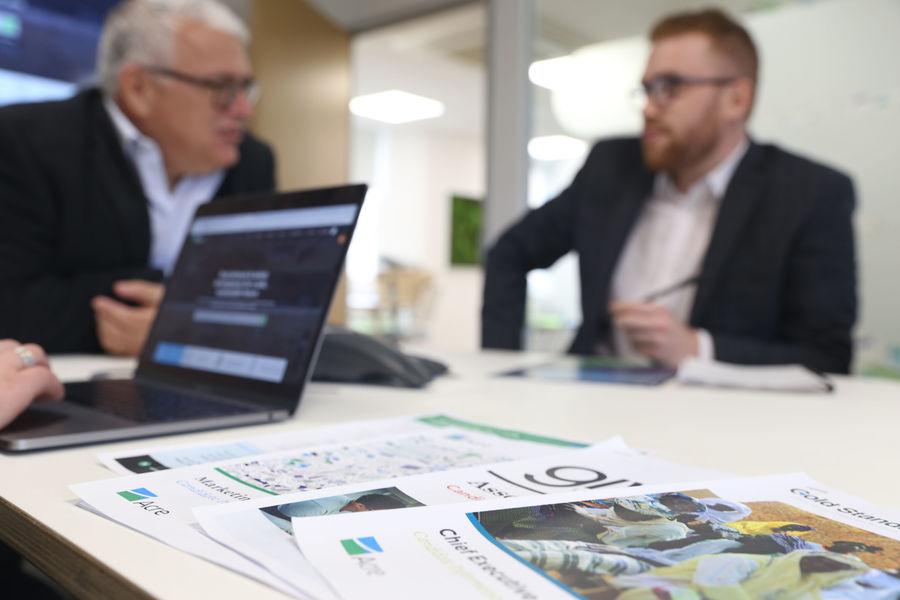How to Future-Proof a Career in Sustainability
by Tanith Allen

As a sustainability professional have you received that look of confusion when you tell somebody what you do? This is a common experience, however, as the profile of the issues we address becomes more visible, society is increasingly connecting with them, presenting the opportunity to more genuinely embed sustainability within a given organisation than ever before.
Whilst the sustainability profession has existed for more than two decades, right now there is an elevated significance of the role these people will play in the future of society, the environment and the economy.
Blue chip and SME executives, along with entrepreneurs and other key commercial decision makers are having to plan strategically to mitigate risk or derive opportunity from issues which are becoming ever more visible; plastics (particularly their visibility where the sea meets the land), the climate crisis – driven to an extent by the voices of a new generation who will inherit the burden that human consumption has created. Other issues also continue to gain visibility – corporates paying their fair share of tax back to the societies who use their products and how people who manufacture such products are treated within the supply chain.
On 26th November I joined the northern hub of the Institute of Corporate Responsibility & Sustainability (ICRS) to discuss the future of corporate sustainability and how the practitioner’s role is changing, and I share some advice and observations below.
1. Be an adaptable innovator
Sustainability can be complex and it’s easy to alienate people. A successful sustainability professional should be a chameleon capable of adapting their communications and understanding the drivers of a diverse set of stakeholders.
This means that success within the role has become increasingly reliant upon non-technical (soft) skills; the ability to convey complex messages in simple terms, the ability to communicate in the language of commerce, and the ability to adapt to a diverse range of stakeholders – perhaps more so than is required in any other profession.
Being adaptable also means being innovative – many of the issues that a sustainability professional will face requires novel thinking (because we are dealing with huge issues which require complex solutions). This means that an approach which may be unusual to other functions within an organisation may be required. A good example of this is the rise of Multi-Stakeholder-Initiatives (MSIs), where companies who compete for market share (often ferociously) come together to solve issues which can only be addressed with scale. Such action requires bold and innovative thought.
2. Opportunity to incentivise
Linking a reward system to key performance indicators (KPIs) for sustainability should, if possible, be rooted across the business to drive engagement and prioritise sustainability targets. This might be as simple as financial incentive, but we have seen several examples where recognition and celebration of employee contributions have helped to foster an organisational culture with sustainability and responsibility in its DNA.
3. Gaining multi-functional experience
While team size has remained reasonably static over the past decade sustainability budgets have increased within many companies who are considered pioneering in sustainability. As a result, a more diverse sustainability job ecosystem is emerging and there is an increased prevalence of sustainability combining with other core business functions; for example, sustainability marketing, sustainable finance and sustainable procurement.
Because they are addressing issues which impact the entire organisation, it is essential that a sustainability professional acquires a strong operational and commercial understanding of the business. This is impossible to achieve if they are primarily operating in a vacuum regardless of business training and qualifications.
With an increased frequency, we see sustainability leaders seconding their team members into other core functions of the business so that they can understand the commercial challenges and opportunities that others face.
By understanding what it is to walk in the shoes of those in other business functions, sustainability professionals can generate more suitable solutions, build trust and achieve better outcomes. By broadening their experience, they also achieve improved access to other career paths and increases the likelihood of their acceptance at ex-co level.
4. Horizon Scanning
The world is moving at a rapid pace. It isn’t enough for a sustainability professional to address issues and capitalise on opportunities that exist now. They must have an eye to the future – the success of their entire organisation may depend on it.
Environmental and social risks can seemingly rear-up quickly. For instance – the pace at which plastics has emerged as a key issue (and one for retailers that is being addressed at exco level) has been dramatic.
Companies who identify the key issues on the horizon are likely to gain a competitive advantage. Those who recognise issues too late may face so much disruption that they cease to trade.
The ability to horizon scan isn’t easy – it requires an understanding of technology, social psychology and a range of environmental and social risks that may yet to be a key agenda item. Sometimes brave decisions will be needed.
An organisations ability to recognise society as a key stakeholder is critical, for instance how will society use products and services in the future. What will society’s expectations be in relation to the ethics and values of companies who they interact with?
5. Be Curious and Courageous
Both qualities are critical. Being curious means understanding the ambitions of drivers of those around you – customers and the exco for instance.
Only when a CEO’s objectives are understood can a sustainability practitioner get full traction, and this may relate to their personal ethical stance as much as their commercial objectives.
This requires the ability to coach, consult and to ask questions before assuming a solution – a sustainability programme with no buy in will have little value.
On the flip side, sustainability professionals must be courageous – they must be able to challenge the outlook of executives in the business and sell more beneficial solutions. This is only possible if they understand the drivers of those in the business and it requires absolute integrity.
About Tanith Allen
Tanith leads Acre’s permanent and contract hiring across Infrastructure, Packaging and Professional Services. Since joining the business, Tanith has developed Acre’s executive consultant platform the Acre Bench, providing flexible support to clients facing some of the most challenging materiality, reporting and supply chain issues in sustainability. Her track record includes placing influencers and decision-makers across the FTSE as well as with leading industry bodies and multi-stakeholder initiatives. Clients include: British Land, Shaftesbury, Bunzl, Ball Corporation and DLA Piper.
She is an experienced project manager and holds a Masters degree from the University of St Andrews.
T: +44 (0)20 7400 5852 | M: tanith.allen@acre.com

